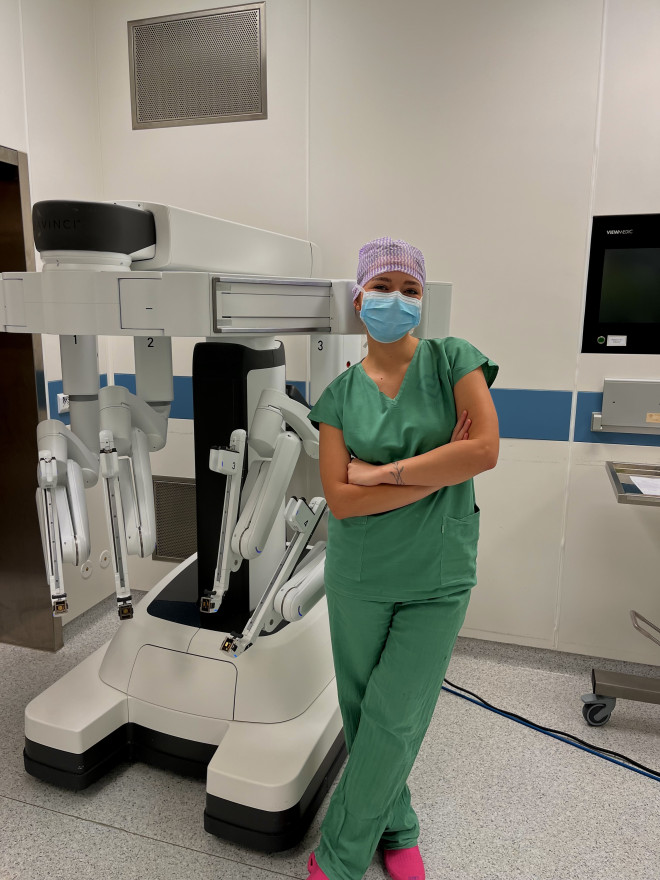Dr Adéla Štekrtová from the Department of Urology at the Second Faculty of Medicine and Motol University Hospital talks about her journey to becoming the youngest Czech female surgeon to use the robotic surgical system.
You won the first year of the Faculty Robotics Olympiade a few years ago, is that right?
Yes, but it was just an informal competition among us, lecturers who were recruited from medical students.
In the Czech Republic, there are about ten female surgeons involved in robotic surgery. If all goes well, you'll be the youngest female robotic surgeon in the country.
So far, only men have been operating behind the da Vinci console in our clinic. I assist in all types of robotic surgery, whether with Dr Novak or Prof. Babjuk. I also have the opportunity to participate at the beginning of the surgery before the surgeon arrives. However, it will take some time before I can perform the whole operation from start to finish. I need to pass the core training exam (kmen), followed by by the board certification (atestace); before the last one it might work out.
Are we talking about a three-year horizon?
My core training exam is due this September, the board certification in another two or three years.
Are there any special talents, qualities that can make a person a good robotic surgeon?
I wouldn't say it depends on character traits, but it's still nice to be able to communicate well with the rest of the team. It's probably not a bad thing to have a good spatial imagination.You can see what's going on in 3D, but it's good to be able to imagine where the robotic arms actually are in the patient. The operator sees his tools in a relatively small cutout, the camera zooms in a lot. But they can't see what's happening in the patient anymore, only the assistant or instrument technician can see that. Sometimes the instruments collide with each other, and their position needs to be adjusted.

Dr Adéla Štekrtová (27) is a graduate of the Second Medical Faculty. During her studies, she was involved in several faculty associations (the dance group Prdlý kosti) or in extracurricular activities in the field of public health prevention in the non-profit organization Loono. She has been pursuing her dream of becoming a surgeon since the beginning. She first came across robotic surgery in her second year of study and has been focusing on urology since her fifth year.
Coordinating both hands and both feet, each limb having a different function on the console, is like trying a higher level of a layup in basketball... it can definitely be a challenge, especially at the beginning.
To me, it's like a video game or learning to drive. Clutch, brake, accelerator. Once I stopped checking with my foot where the pedal was, it went all pretty quicky. In the end, it's quite intuitive and you get used to it quickly.
Is there interest in robotic surgery among the younger generation of students? Is it hard to get behind the console?
It seems to me that not many students from the younger generation want to go into surgery. We've only had two or three in our student group.
It seems to me that not many students from the younger generation want to go into surgery. We've only had two or three in our student group.
It is commonly believed that surgery is physically demanding...
I do not like this talk about how it's not a field for women because it's physically demanding. Why should a physically demanding surgery be done by a chosen guy? I'm a little extreme about this.
I do not like this talk about how it's not a field for women because it's physically demanding. Why should a physically demanding surgery be done by a chosen guy? I'm a little extreme about this.
And since we're on thin ice: surgery is also said to be a bit of a macho field...
... yes, and a huge ego trip! At almost every surgical internship, we women were talked out of staying in the field. You'll change your mind, they said. I heard loads of classic clichés.
Anyway, I suppose surgery is a demanding environment when it comes to performance: surgeons go without food, drink, and sleep, enduring long hours in operating theatre.
Maybe in major orthopaedic or neurosurgical operations... Yes, but with younger people entering the field, things are becoming different. It's not just about slaving away and making a hero of yourself, but it also depends on each clinic and what the vibe is like in there.
Do you know any other female robotic surgeons?
No, I don't personally know another woman behind the console.
Did you picture yourself behind the console in some urology department already during your studies?
I originally wanted to do surgery. Internal medicine, for instance, where everything is researched for a long time, is not for me. I like to identify a problem quickly and get it fixed right away. In the 5th year we had urology and an optional laparoscopy course and I stayed in urology. It's an interesting field even on the surgery or robotics side. We do robotic procedures almost every day. I'm quite bold and one day I simply asked if I could sit behind the console and try it and it worked. I just sat there one day and so far it's working out. And I hope that in time I will be able to do the whole performance from start to finish.
I'm quite bold and one day I simply asked if I could sit behind the console and try it and it worked. I just sat there one day and so far it's working out.
Large open surgeries are increasingly being abandoned, robotic surgery seems to be the future of medicine. Is robotic surgery itself moving forward?
Last year, my colleagues and I were at the European Urology Conference in Paris, and robotics is moving incredibly forward, with remote surgery being tried across half the world, and imaging and surgical techniques improving. Big procedures are becoming minimally invasive, our generation will have the opposite problem: how to do open procedures, as there are less and less of them.
Robotics is moving incredibly forward, with remote surgery is being tried across half the world, and imaging and surgical techniques improving. Big procedures are becoming minimally invasive...
Urology is a specialisation that is often passed down in family... Do you also come from a medical family?
No, my closest relative who is also a doctor is my older sister. She chose internal medicine, more specifically cardiology.
That'll give your parents awesome care in their old age.
They'd have to listen to us sometime, too! (laughs).
Let's go back in time for a moment: You're a medical school applicant again. What would you like to have heard back then?
I used to be quite stressed at uni before the exams, so I guess I didn't have to stress that much. It's important to take time for yourself. That's what really matters. I did a lot of internships at school, and ironically, I began to enjoy my time off after I started working. I travel a lot.
How to become a robotic surgeon?
The doctor and his assistant are trained in several stages. The da Vinci Technology Training Pathway has four phases, including many hours in the simulator. First, the doctor gets used to working with his hands, then adds his feet, which control the pedals that operate the camera and other instruments. The basic exercise looks like a computer game; it's all about placing a virtual ball into a container as quickly and accurately as possible, alternating between right and left hands. "You have to get used to the flexibility of the tool, that you can move it just like your wrist. The goal of all training, as with driving, is to get the controls under the skin so we don't have to think about what's where. Just like in a car, you know where the turn signals are and where the wipers are," says Jan Zatloukal from the company Synektik, an exclusive distributor of da Vinci Surgical System in Poland, Czech Republic and Slovakia. After a few hours of simulations, there are then lessons on a specific robot model in the operating room of the hospital, there is also an "artificial abdomen", followed by a certification course for the console surgeon and his assistant, which includes surgery on a pig model under anaesthesia.













